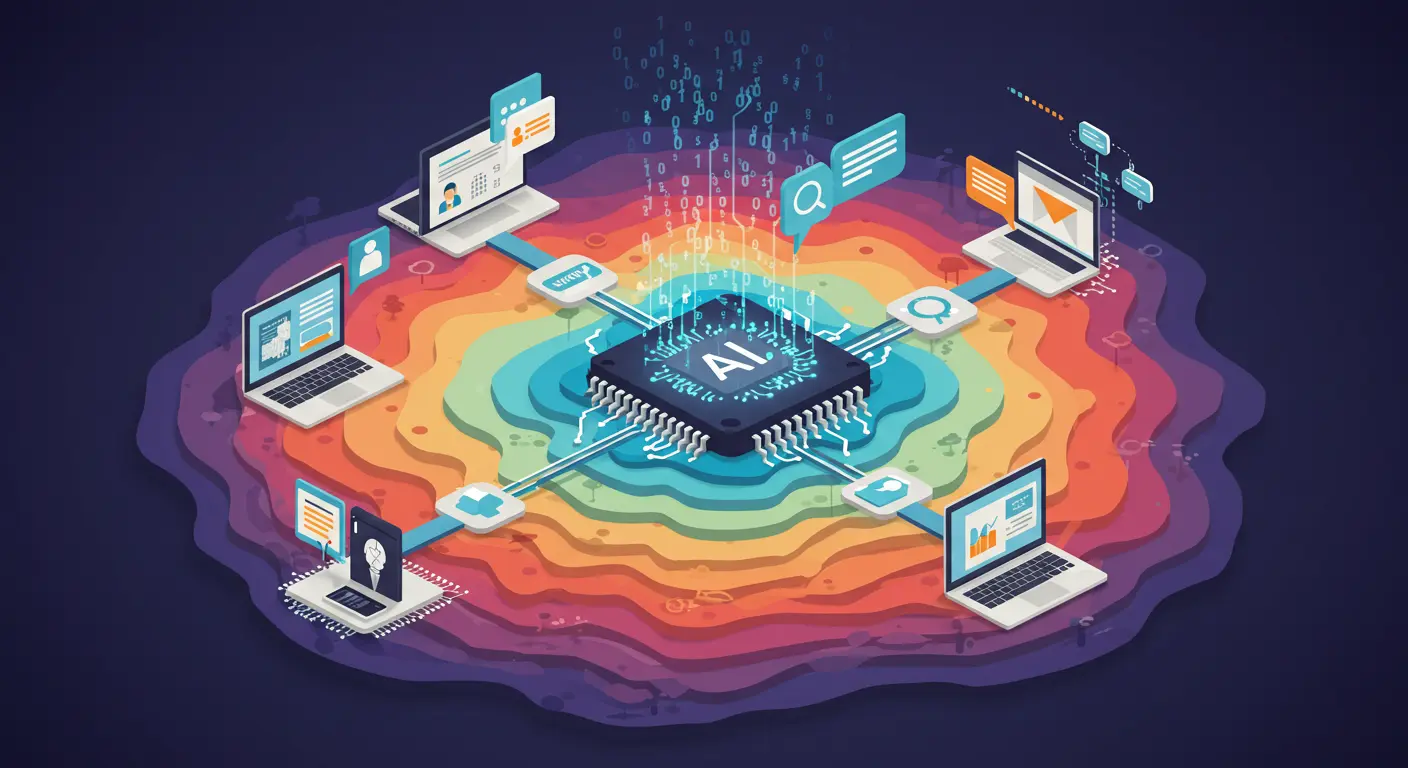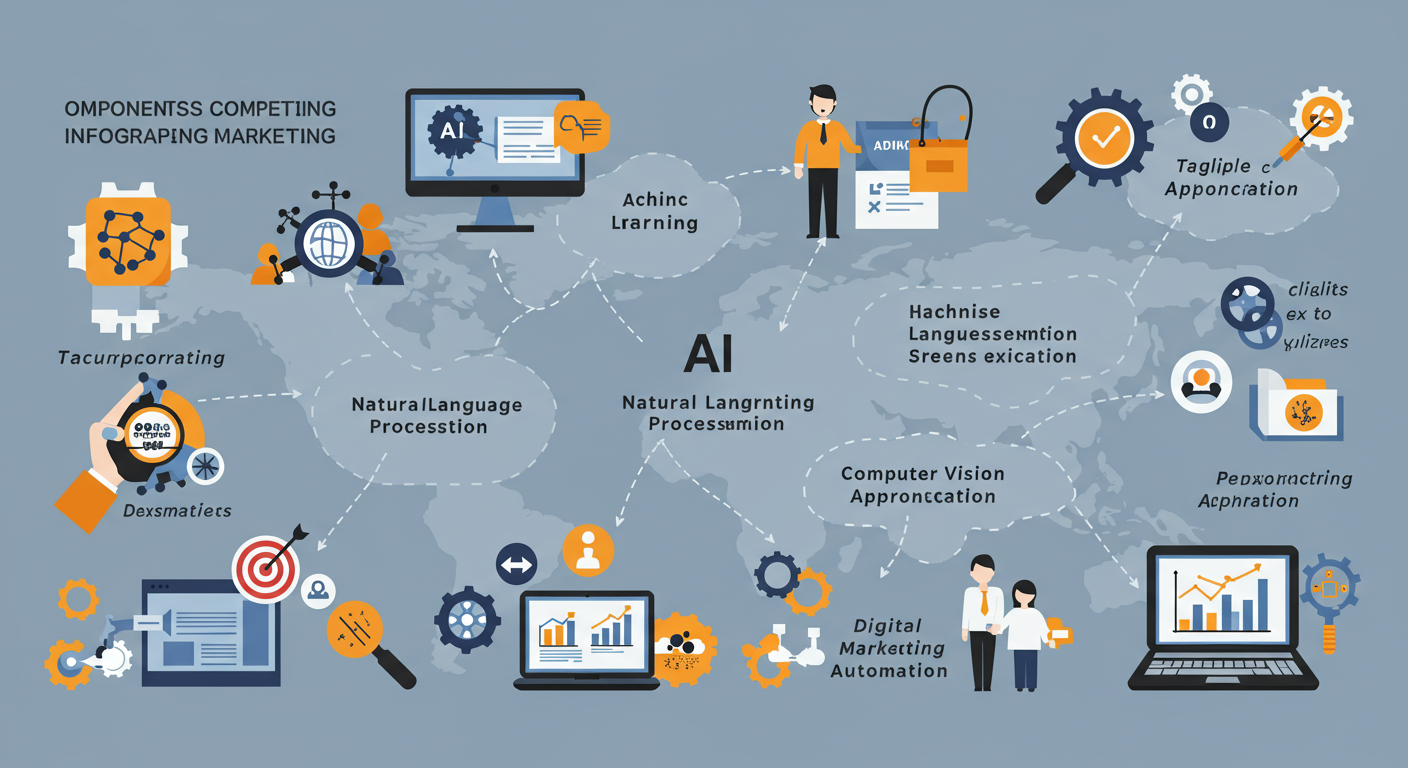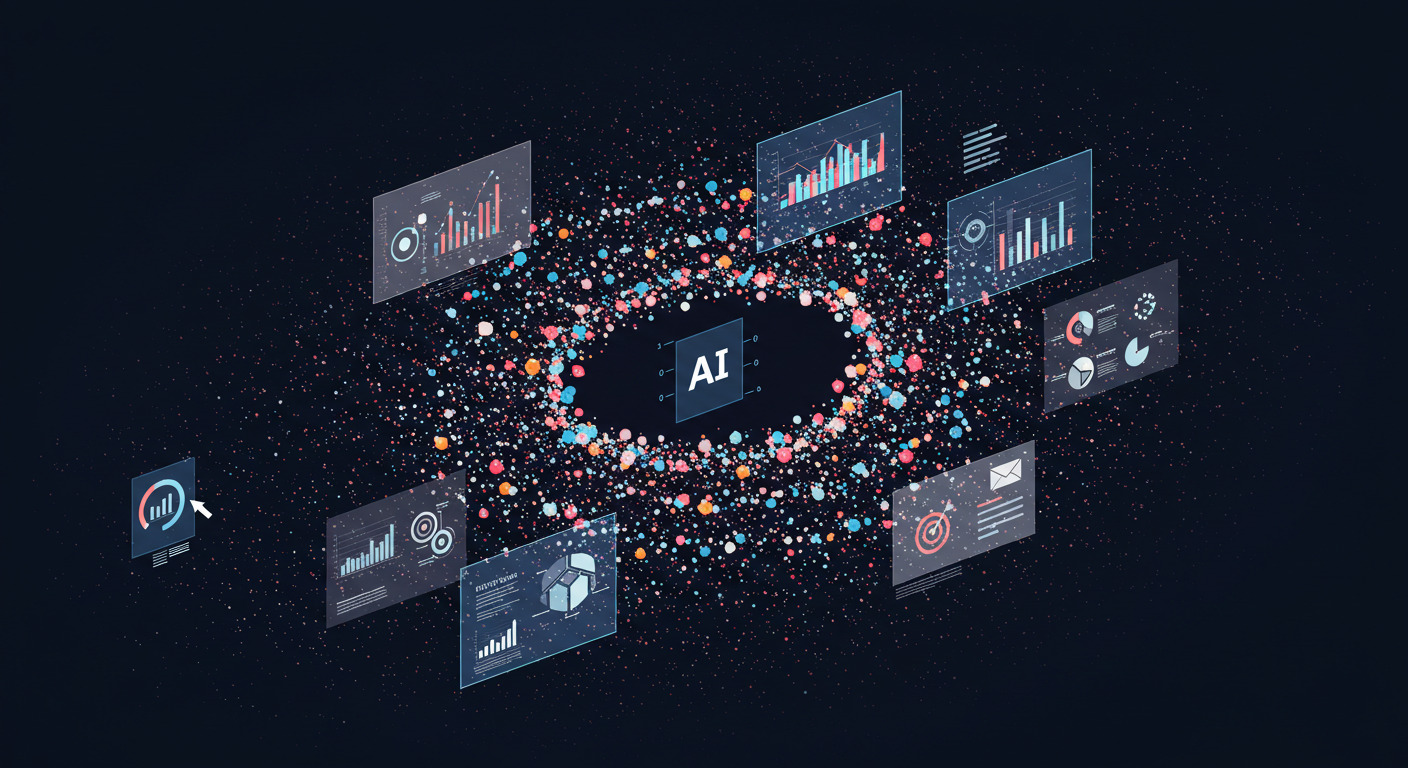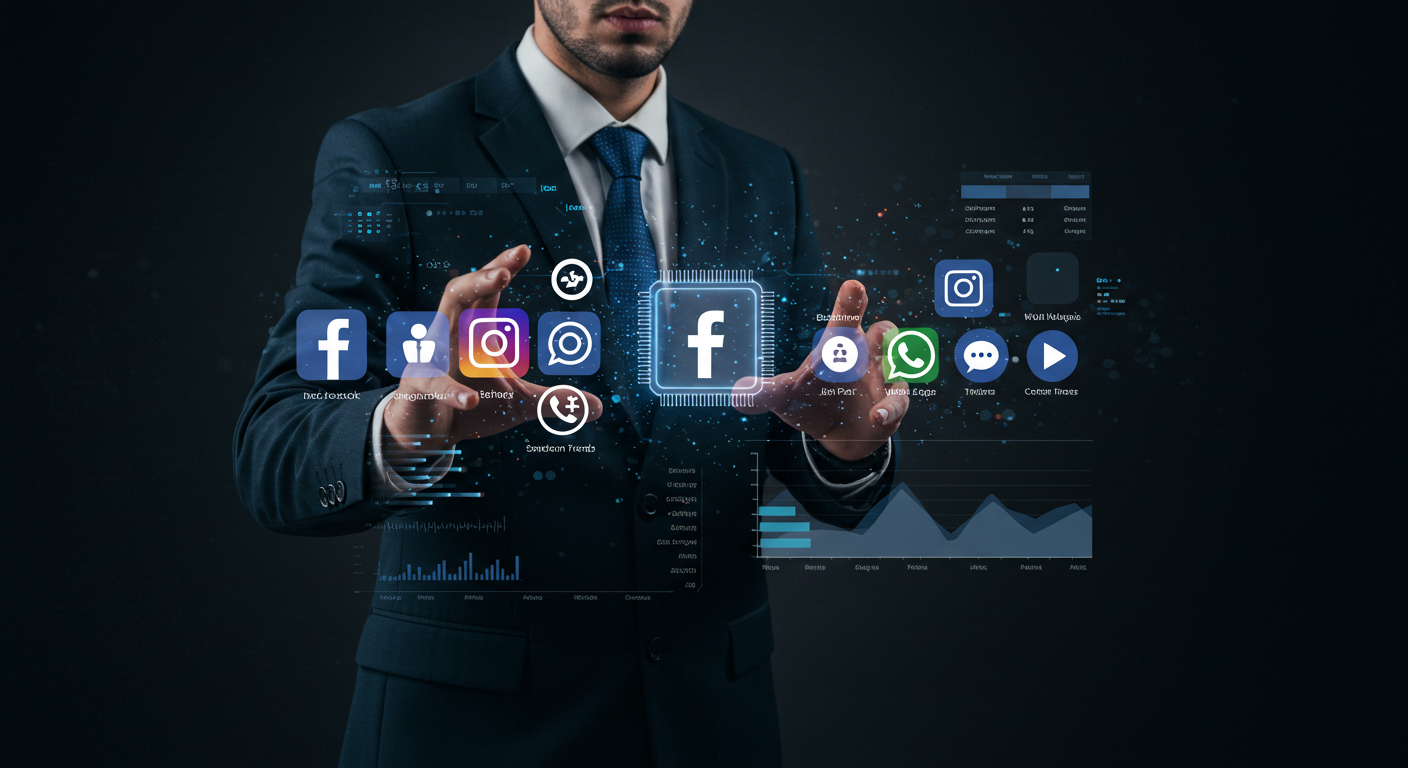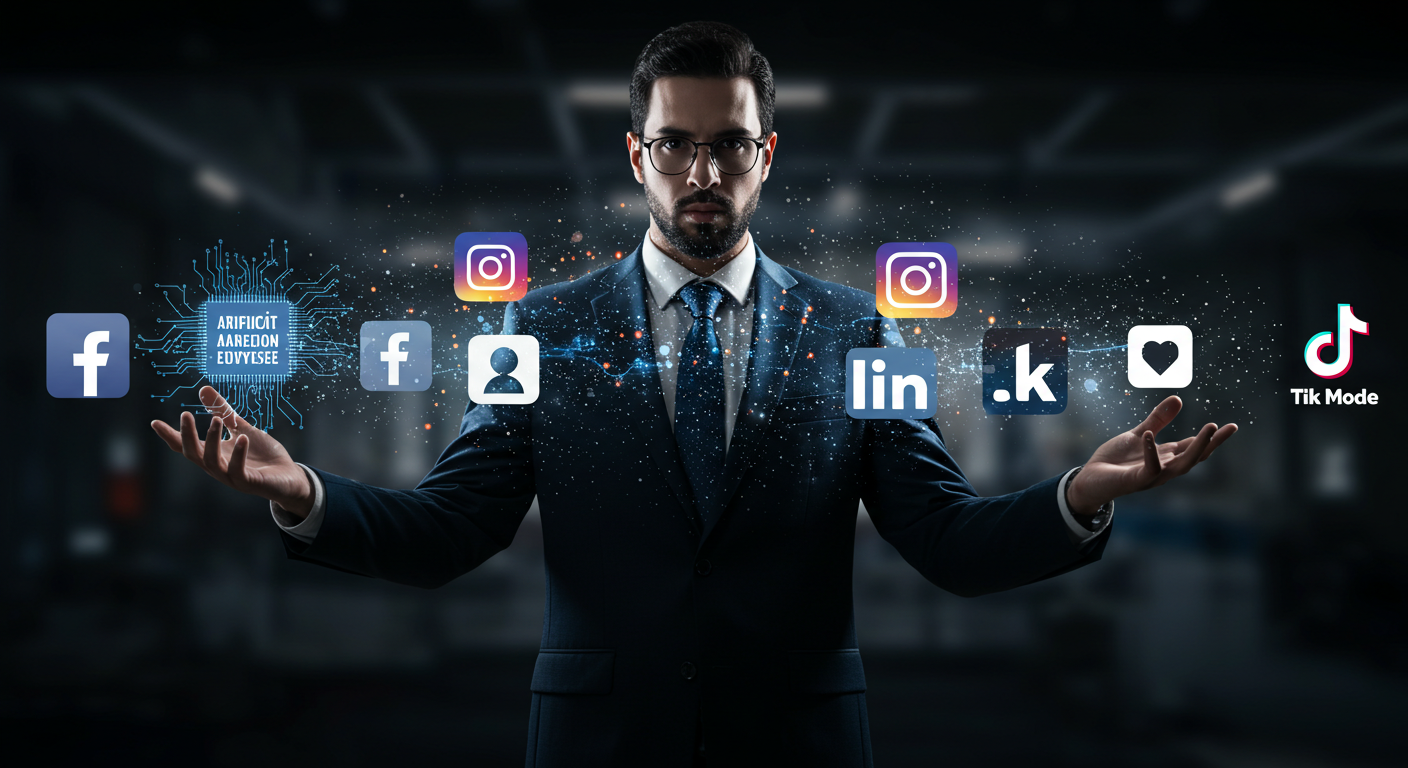The Role of Artificial Intelligence in Digital Marketing: A Radical Transformation in the World of Marketing
Introduction
The world of digital marketing is witnessing rapid evolution with the entry of artificial intelligence technologies into the competitive arena. These advanced technologies have become pivotal in shaping modern marketing strategies, enhancing customer experience, and increasing return on investment. We can say that artificial intelligence has brought about a true revolution in the field of digital marketing through its ability to analyze vast amounts of data, extract valuable insights from it, predict consumer behavior, and automate various marketing processes.
In this article, we will detail how artificial intelligence is changing the face of digital marketing, the various applications that can be used, the challenges marketers may face when adopting these technologies, and the future of digital marketing in light of the evolution of artificial intelligence.
What is artificial intelligence in digital marketing?
Artificial intelligence in digital marketing refers to the use of algorithms and advanced techniques to simulate human intelligence in executing and optimizing marketing strategies. It relies on technologies such as machine learning, natural language processing, computer vision, and deep learning to analyze data and provide insights that help in making more effective marketing decisions.
Artificial intelligence in digital marketing can be defined as the use of intelligent systems that can learn from data and improve their performance over time to achieve specific marketing goals, such as increasing conversions, enhancing customer experience, personalizing content, and other marketing objectives.
Applications of Artificial Intelligence in Digital Marketing
1. Content and Advertising Personalization
Personalization of content and advertisements is one of the most important applications of artificial intelligence in digital marketing. AI algorithms can analyze user behavior and preferences to deliver tailored content and ads for each individual user. According to a study conducted by McKinsey, 71% of consumers expect personalized experiences, and companies that succeed in providing these experiences can increase their revenues by up to 40%.
AI technologies enable marketers to:
- Providing product recommendations based on previous browsing and purchasing behavior
- Customizing email messages based on user interests
- Display targeted ads based on demographic and behavioral data
- Personalizing the user experience on websites according to the needs of each visitor
2. Data Analysis and Consumer Behavior Prediction
Artificial intelligence has an extraordinary ability to analyze vast amounts of data quickly and accurately, surpassing human capability. Marketers can use this ability to understand consumer behavior and predict their future trends. According to a report published by Salesforce, 84% of marketers are already using or planning to use artificial intelligence in their marketing strategies.
Data analysis and forecasting applications include:
- Identifying the most convertible potential customers
- Predicting the products that customers may buy in the future
- Discovering new patterns and trends in the market
- Determining the best times to launch marketing campaigns
- Sentiment analysis towards the brand or products
3. Search Engine Optimization (SEO)
Artificial intelligence has brought about a fundamental change in the field of search engine optimization, especially with the evolution of search algorithms like Google BERT and MUM. AI helps marketers improve their SEO strategies by:
- Identifying the most effective keywords for content
- Suggesting suitable content topics based on search intent
- Analysis of competitors' content and identifying gaps that can be targeted
- Improving the technical structure of the site to facilitate search engine indexing
- Predicting changes in search algorithms and adapting to them
According to a study conducted by BrightEdge, 60% of marketing managers plan to increase their investments in AI technologies related to search engine optimization.
4. Chatbots and Customer Service
AI-powered chatbots represent a revolution in the field of customer service and interactive marketing. These chatbots can interact with customers naturally and answer their inquiries around the clock, contributing to:
- Improving customer experience through immediate responses to their inquiries
- Reducing costs associated with traditional customer service
- Collect valuable data about customer interests and needs
- Increasing conversion rates by providing timely assistance
- Guiding customers towards products that meet their needs
A study conducted by Gartner indicates that 25% of customer service operations will be handled by chatbots by 2025, representing a significant increase compared to previous years.
5. Creating AI-Powered Content
Artificial intelligence has become capable of creating diverse marketing content, ranging from articles and blogs to social media posts and advertising copy. The benefits of AI-powered content include:
- Creating large amounts of content quickly and efficiently
- Improving the current content to meet SEO standards
- Proposing attractive titles and topics for the target audience
- Content performance analysis and providing recommendations for improvement
- Creating multiple copies of content to test its effectiveness
According to a survey conducted by Semrush, 75% of marketers use AI tools to create content or plan to use them in the near future.
6. Social Media Marketing
Artificial intelligence plays an increasingly important role in social media marketing strategies, as it helps marketers to:
- Analysis of Social Media Trends and Discovering Trending Content
- Identifying the best times to post to increase engagement
- Analysis of post performance and providing recommendations for improvement
- Creating customized content for different platforms
- Targeting the right audience for each marketing campaign
A study conducted by HubSpot indicates that companies using artificial intelligence in their social media marketing strategies experience an increase in engagement rates of up to 50% compared to traditional methods.
7. Video and Image Marketing
The capabilities of artificial intelligence extend to the field of visual marketing, where it can:
- Creating attractive images and videos for marketing campaigns
- Analysis of visual content to understand the most appealing elements to the audience
- Customizing video content based on viewer preferences
- Improving video content to appear in search results
- Analysis of viewers' emotions towards visual content
According to a report from Cisco, video will account for 82% of internet traffic by 2025, making the use of artificial intelligence in video marketing vital.
Benefits of Using Artificial Intelligence in Digital Marketing
1. Improving the efficiency of marketing campaigns
Artificial intelligence contributes to improving the efficiency of marketing campaigns by:
- Automating routine tasks and saving time for marketers to focus on strategy
- Improving the targeting of the right audience at the right time
- Improving the distribution of the marketing budget across the most effective channels
- Providing real-time insights and recommendations to improve campaign performance
A study from Harvard Business Review indicates that companies using artificial intelligence in marketing experience an increase in productivity ranging from 20% to 40%.
2. Reducing marketing costs
Artificial intelligence helps reduce marketing costs by:
- Automation of tasks that previously required large teams
- Reducing waste in advertising spending through precise targeting
- Improving conversion rates, which leads to a decrease in acquisition costs
- Accelerating content creation processes and data analysis
According to a study conducted by PwC, artificial intelligence can help reduce operational costs by up to 30% in various sectors, including marketing.
3. Improving Customer Experience
Artificial intelligence significantly contributes to enhancing the customer experience by:
- Providing personalized experiences that meet the needs of every client
- Providing 24/7 support through chatbots
- Facilitating the process of discovering suitable products
- Providing smart recommendations that help customers make purchasing decisions
A study by Accenture indicates that 91% of consumers prefer to engage with brands that remember their preferences and provide relevant recommendations.
Challenges of Using Artificial Intelligence in Digital Marketing
1. Privacy and Data Protection Concerns
As reliance on data in AI-driven marketing increases, concerns regarding privacy and data protection emerge. Marketers must consider:
- Compliance with data protection laws such as GDPR and CCPA
- Obtaining user consent before collecting their data
- Ensuring the security and confidentiality of data used in artificial intelligence models
- Dealing transparently with customers about how their data is used
According to a study by Pew Research, 79% of consumers are concerned about how companies use their personal data.
2. The need for new skills and experiences
Using artificial intelligence in digital marketing requires new skills and expertise, which can pose a challenge for organizations. These skills include:
- Understanding the Basics of Artificial Intelligence and Machine Learning
- The ability to analyze and interpret data effectively
- Knowing how to train and fine-tune artificial intelligence models
- Understanding the integration between artificial intelligence and traditional marketing strategies
A study from LinkedIn indicates that the demand for professionals with skills in artificial intelligence is increasing by 74% annually.
3. Initial Implementation Cost
The cost of implementing artificial intelligence solutions in marketing can be high initially, which poses a barrier for small and medium-sized enterprises. These costs include:
- Purchasing or developing artificial intelligence software
- Training employees to use new technologies
- Integration of artificial intelligence solutions with existing systems
- Continuous maintenance and updating of systems
However, a study by Deloitte indicates that 82% of companies that invested in artificial intelligence achieved a positive return on investment within two years.
The Future of Artificial Intelligence in Digital Marketing
1. Predictive Marketing
The reliance on predictive marketing will increase in the future, as AI models will be able to:
- Predicting consumer behavior more accurately
- Identifying potential customers before they begin the buying journey
- Forecasting future market trends
- Determining the best timing to communicate with each client
A study from Forrester indicates that 58% of marketing managers plan to increase their investments in predictive marketing technologies over the coming years.
2. Voice Marketing and Voice Search
With the rise of voice assistants like Alexa and Google Assistant, voice marketing will become an essential part of digital marketing strategies. This will include:
- Optimizing content for voice search
- Creating interactive marketing experiences using sound
- Development of skills and applications for voice assistants
- Integrating Voice in Multichannel Marketing Strategies
Juniper Research forecasts that the number of devices equipped with voice assistants will reach 8.4 billion devices by 2024.
3. Marketing through Augmented and Virtual Reality
Artificial intelligence will integrate with augmented and virtual reality technologies to create immersive marketing experiences, such as:
- Experience products virtually before purchase
- Virtual tours for stores and facilities
- Interactive advertisements that use augmented reality to interact with the surrounding environment
- Personalized shopping experiences in virtual environments
According to a study conducted by Gartner, 70% of organizations will test augmented reality and virtual reality applications for marketing purposes by 2025.
4. Marketing Using Advanced Chatbots
Chatbots will evolve to become smarter and more capable of natural interaction with customers, which will lead to:
- More complex conversations and understanding of the context of the dialogue
- Providing personalized marketing experiences in real time
- Conducting natural voice conversations that simulate human interaction
- Providing complex recommendations and solutions based on client needs
A study from Business Insider predicts that the chatbot market will grow at a compound annual growth rate of 29.7% until 2027.
5. Fully Automated Marketing
We will witness the emergence of fully automated marketing systems in the future that can:
- Planning, executing, and analyzing marketing campaigns independently
- Real-time adjustment of strategies based on results
- Smart distribution of marketing budgets across different channels
- Creating and continuously improving content
A study from MarketsandMarkets indicates that the marketing automation market will grow from $4.06 billion in 2020 to $8.42 billion by 2027.
Best Practices for Adopting Artificial Intelligence in Digital Marketing
1. Starting with small and measurable projects
When adopting artificial intelligence in a digital marketing strategy, it is advisable to start with small, measurable projects, such as:
- Improving Email Campaigns Using Content Personalization
- Implementing a simple chatbot to answer frequently asked questions
- Using artificial intelligence analytics to improve targeted advertising campaigns
This approach allows organizations to measure return on investment and learn lessons before expanding the use of artificial intelligence.
2. Combining Human Intelligence and Artificial Intelligence
The goal of adopting artificial intelligence should be to enhance the capabilities of the marketing team, not to replace it. This can be achieved through:
- Using artificial intelligence for routine tasks and data analysis
- Relying on human creativity in developing strategies and crafting messages
- Training the team to work effectively with artificial intelligence tools
- Using artificial intelligence as a decision-making support tool
A study from McKinsey indicates that the best results are achieved when humans and artificial intelligence work together, where productivity can increase by up to 40%.
3. Focus on Data Quality
The success of artificial intelligence applications in marketing largely depends on the quality of the data used. To improve data quality, it is recommended to:
- Perform regular operations to clean and update data
- Unifying different data sources in an integrated system
- Ensuring the accuracy and comprehensiveness of the collected data
- Establishing a strong infrastructure for data management
According to a study by IBM, the cost of low-quality data is estimated to be $3.1 trillion annually in the United States alone.
4. Attention to ethics and transparency
As the use of artificial intelligence in marketing increases, attention must be paid to ethical aspects and transparency, through:
- Informing customers about how their data is used and how it affects their experience
- Avoiding bias in artificial intelligence algorithms
- Compliance with laws and regulations related to data protection
- Giving customers options to control how their data is used
A study by Accenture indicates that 62% of consumers will be more loyal to brands that are transparent about how they use their data.
How to Optimize Content for Search Engines Using Artificial Intelligence
To ensure that this article reaches the first page of search results, artificial intelligence can be used to optimize the content by:
1. Keyword Analysis
Using artificial intelligence tools to identify the most effective keywords in the field of artificial intelligence and digital marketing, such as:
- "Artificial Intelligence in Marketing"
- "Applications of Artificial Intelligence in Digital Marketing"
- "How to Use Artificial Intelligence to Improve Marketing Strategies"
- "Benefits of Artificial Intelligence for Marketers"
- "The Future of Marketing with Artificial Intelligence"
It is recommended to distribute these keywords naturally within the content and include them in the titles, meta descriptions, and alt text for images.
2. Improve content structure
Using artificial intelligence to analyze competing content and improve article structure by:
- Create attractive and organized headlines and subheadings.
- Break content into short, easy-to-read paragraphs.
- Use bulleted lists to organize information.
- Include questions and answers that meet the needs of researchers.
This structure helps search engines understand the topic of the article and rank it correctly.
3. Improve internal and external links
Artificial intelligence can be used to identify internal and external linking opportunities, by:
- Identify technical terms that can be associated with explanatory content.
- Suggest reliable sources for external links
- Link structure analysis of competing sites
- Optimize anchor texts to increase click-through rate
Internal and external links contribute to improving the structure of the site and increasing its credibility with search engines.
conclusion
Artificial intelligence represents a fundamental shift in the world of digital marketing, offering unprecedented opportunities for improved targeting, personalized experiences, process automation, and deeper data analysis. By strategically adopting AI, marketers can achieve better results at a lower cost and with greater efficiency.
However, marketers must consider the challenges associated with adopting AI, such as privacy concerns, the need for new skills, and the initial implementation cost. By following best practices and focusing on balancing AI with human intelligence, organizations can maximize the benefits of these revolutionary technologies.
The future of digital marketing will increasingly rely on artificial intelligence, with new and innovative applications constantly emerging. Organizations that take the initiative to adopt these technologies and develop effective strategies for their use will be better positioned to compete in the evolving digital marketplace.
Sources
- McKinsey & Company. (2023). "The State of AI in 2023: Generative AI's Breakout Year."
- Salesforce Research. (2023). "State of Marketing Report."
- BrightEdge. (2023). "The Future of Marketing and AI."
- Gartner. (2023). "Emerging Technologies in Marketing."
- Harvard Business Review. (2022). "How AI Is Transforming Marketing."
- Accenture. (2023). "Technology Vision for Marketing."
- Deloitte. (2022). "AI and the Future of Marketing."
- Forrester Research. (2023). "The ROI of AI in Marketing."
- Cisco. (2023). "Visual Networking Index."
- PwC. (2023). "Global AI Study: Exploiting the AI Revolution."
- LinkedIn. (2023). "Emerging Jobs Report."
- Business Insider Intelligence. (2023). "The Chatbot Market."
- MarketsandMarkets. (2023). "Marketing Automation Market Report."
- Juniper Research. (2023). "Digital Voice Assistants: Trends and Forecasts."
- IBM. (2022). "The Cost of Poor Data Quality."
- Semrush. (2023). "Content Marketing and AI Trends."
- HubSpot. (2023). "Social Media Marketing Trends."
- Pew Research Center. (2022). "Consumer Privacy Concerns."
Note: This article was written by artificial intelligence websites, and even the images were generated by artificial intelligence websites.
